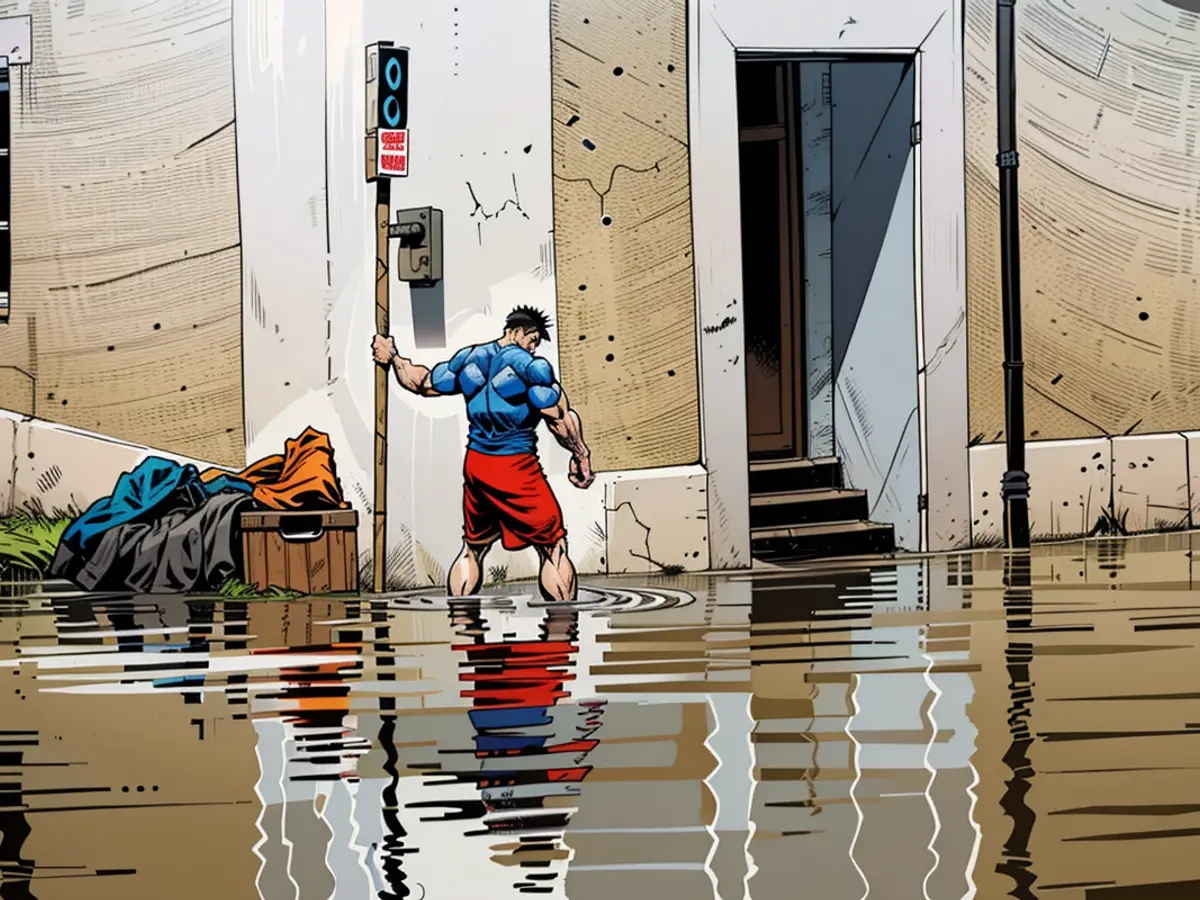Meteorological Conditions - Flooding waters continue to recede, but tension persists.
The floodwaters in the lower Danube are gradually subsiding, but the situation in Bavaria, particularly in Regensburg, remains precarious. Authorities and emergency responders are keeping an eye on a saturated street in the old town, fearful of potential slippage of protective barriers. In Passau, water levels are decreasing, though at a slower pace. The regions of Swabia and Upper Bavaria are still far from returning to normalcy. No new information is available regarding missing individuals.
The German Meteorological Service (DWD) anticipates bright skies with occasional thunderstorms and heavy rains of up to 25 liters per square meter per hour in the afternoon in Bavaria. In the southern part of the state, there could be "stormy developments" with heavy rain and hail in the evening.
In Regensburg, attention is centered on Werftstraße. To alleviate pressure on the defensive barriers, the city momentarily halted pumping the water under the barriers back into the Danube. Out of concern that the fragile ground could collapse, allowing the protective barriers to slip, some inflow was permitted.
Some 45 kilometers downstream in Straubing, monitoring efforts continue. The city administration highlighted the high groundwater level and urged citizens to exercise caution and patience. "A high groundwater level may result in water infiltrating basement rooms," they remarked in a statement.
Deggendorf's District Administrator, Bernd Sibler (CSU), reported stable dikes and a slowly retreating flood wave. The local politician appealed to the common sense of citizens: "Dikes are not venues for revelry."
Federal Chancellor Olaf Scholz (SPD) offered his assistance to those affected by the floods. The extent of the damage is tremendous. "We'll assess these damages, as we have with previous floods, along with the states and extend aid," Scholz stated in his government address in the Bundestag. The chancellor also thanked all helpers. "In times of adversity, we rally and band together. That's how it is. That's Germany," he stressed.
Concurrently, Scholz conceded that the federal government and the states must enhance their preparation for such catastrophes. Hence, coastal protection and inland flood protection will be reinforced. Throughout the nation, flood meadows and retention basins must be created, even if unpopular. There's also progress being made in the realm of natural disaster insurance. On June 20, Scholz aims to discuss these matters with the prime ministers and minister-presidents of the states. "Residents need to secure insurance against natural disasters," Scholz underscored.
Regular building insurance covers damage from hurricanes and hail, but not from floods. In locations where flooding is likely, homeowners have been finding it challenging to locate insurers currently. The federal government and states have repeatedly paid for the aftermath of flood disasters, amounting to billions in expenses for the public. There is now a debate about a liability insurance for natural catastrophes. The states have already requested the federal government, via the Bundesrat, to propose a federal law on implementing a mandatory insurance a year ago.
In Passau, the Danube and Inn water levels are descending - albeit at a high level. Yesterday, Bavarian Prime Minister Markus Söder (CSU) visited the ancient town. Mayor Jürgen Dupper (SPD) looked forward: "The next several days will center on cleanup efforts." However, he also asked for tolerance due to the water's slow movement. As of now, schools and kindergartens in the old town have been authorized to reopen.
Ongoing search for firefighter who capsized
In Swabia, the search continues for the firefighter who capsized with his boat during a flood rescue operation on Sunday in Offingen. In addition, other individuals were reported missing. At least six fatalities have been reported due to the floods in South Germany - all four in Bavaria.
Read also:
- The situation in Kelheim, located in Lower Bavaria, is being closely monitored due to the ongoing flood risks in southern Germany.
- The DWD has forecasted potential misfortunes for the climate in Southern Germany, including thunderstorms and heavy rain in Bavaria, which could exacerbate flooding concerns.
- Olaf Scholz, the SPD leader and German Chancellor, has expressed sympathy for the affected residents of Swabia and Upper Bavaria, urging reinforcement of coastal and inland flood protection along with the creation of flood meadows and retention basins.
- The Federal Minister for the Environment, Svenja Schulze, alongside Scholz, is planning to discuss natural disaster insurance on June 20 with the prime ministers and minister-presidents of the states to address the challenge of finding insurance for homes in flood-prone areas.
- In Passau, the federal government and the state of Bavaria are working together to reduce the Bow on the Danube, which has been impacted by the floodwaters, and restore the city to its pre-flood state.
- Straubing's flood zone has suffered from high groundwater levels, causing concern among residents and requiring the suspension of pumping water underneath defensive barriers to prevent their potential collapse.
- The town of Deggendorf in Lower Bavaria has reported stable dikes and a slow retreat of the floodwave, albeit with warnings against misusing the dikes for recreation or celebration.
- The search for a firefighter who capsized during flood rescue operations in Swabia has continued, with at least six fatalities reported due to the floods in Bavaria.
- In Regensburg, the city has had to allow some inflow of water due to the fear of fragile ground collapsing and potentially allowing protective barriers to slip, further exacerbating the flood situation.
- The CSU and SPD have both been actively involved in the relief efforts, with Prime Minister Söder (CSU) visiting Passau and Mayor Dupper (SPD) looking forward to the next few days of clean-up efforts.






